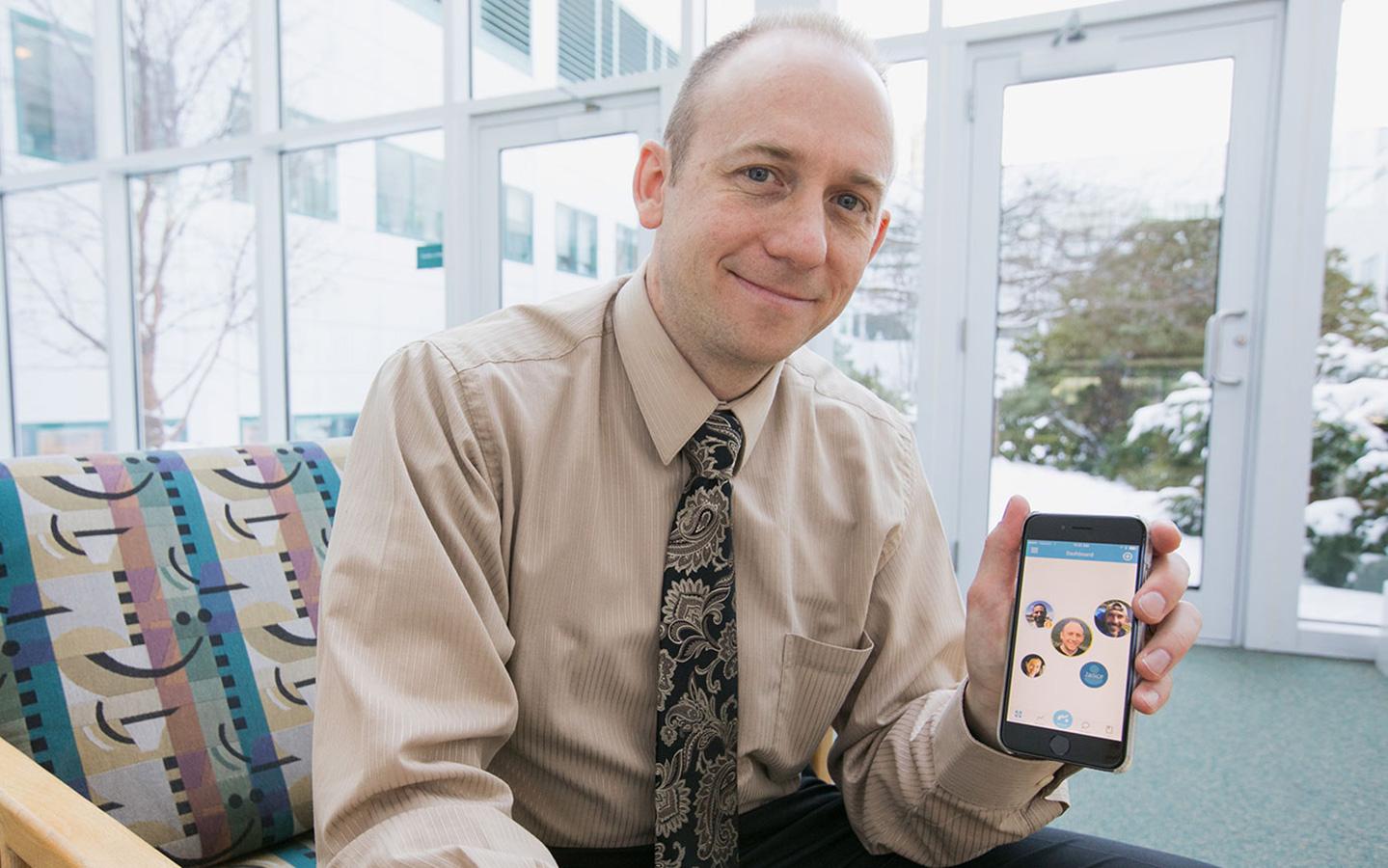Proxi App Places Friends and Family on Mental Health Care Teams
“We see this as a way to transform mental health treatment,” says Geisel’s William Hudenko.

Many people with mental illness rely on friends and relatives for help and encouragement, notes William Hudenko, a professor of psychiatry at the Geisel School of Medicine. Hudenko believes those “natural supports” should be part of the patient’s health care team.
But federal confidentiality rules prevent doctors from sharing information about their patients. So Hudenko has worked with colleagues at Dartmouth to develop software that complies with federal law by allowing the patient, rather than the doctor, to create a network of helpers and authorize them to communicate online with each other. It’s called Proxi-Connect, and Hudenko believes it has the potential to transform mental health treatment through better care.
“I show my patients on a computer how they can use this technology to identify the people in their lives who help them feel better and make progress,” says Hudenko. “If the patient agrees and signs a release of information, I can talk to all of them and they can talk to me and to each other. Communication among the Proxi team changes everything, because I know so much more than I learn just from spending an hour a week with my patient.”
Hudenko also helped to develop an app called Proxi-Reach. He demonstrates it on his smart phone using a fictional patient named Jane, who is battling depression. “There’s her picture in the center of the screen,” he says, “and surrounding her are the photos or names of people she trusts to help her when she needs it. If they download the app, they get an email inviting them to join her circle of care.”
He shows how Jane can reach out by sending short messages to her Proxi-Reach circle. Or circle members may decide on their own to offer encouragement to her. “Maybe she needs a pick-me-up and you can send her a flower. Or maybe you want to send her something funny, like a goofy cat animation,” Hudenko says, bringing the comical cat onto the screen.
Too often, Hudenko says, people have to battle illnesses like depression alone. “Their loved ones care, but they don’t want to broach the subject of suicide, and they don’t know what to say that would be helpful and not damaging. So often what happens is that person gets no communication at all from people who could really provide support.”
The user-friendly app is designed to break through isolation—in appropriate ways. Care team members are allowed to compose only short messages, since even well-intentioned longer messages might be unintentionally harmful to someone in crisis. This reduces the barrier to providing support while allowing an easy way to check in. Proxi also allows senders to choose from pre-composed sentences, such as “Thinking of you,” or “Hope you’re okay!”
The software suite offers other treatment tools as well. If a clinician is added to the care team, then Proxi-Connect becomes available on the app to allow more complex, secure messages between care team members. Proxi-Assess provides patients and clinicians with the ability to monitor progress, and Proxi-Learn allows patients to learn about mental illness.
So far, about 500 users are signed into the Proxi system, and Hudenko has had widespread interest in the app. This includes discussions with Dartmouth College about its use with students and with Dartmouth-Hitchcock Medical Center for adoption by patients.
Hudenko has also worked with researchers at the University of Vermont Medical Center to create a suicide-risk-assessment tool that is offered exclusively on the Proxi platform.
Hudenko says Proxi works especially well for children, substance abusers, people on the autism spectrum, and older patients—all of whom typically need attention from a large number of providers and family members. “We see this as a way to transform mental health treatment,” Hudenko says. “It may not replace one-on-one counseling, nor should it, but it can fill gaps and provide care to people who hadn’t been able to receive it, including those with schizophrenia and depression for whom it can be challenging to come into an office on a weekly basis.”
To develop Proxi, Hudenko got a $25,000 start-up grant from the Dartmouth Entrepreneurial Network (DEN). Students from the DALI Lab created the prototype. Lori Loeb, DALI’s executive director and a research professor in computer science, says Proxi was an ideal lab project, with a steep learning curve for student designers and a real-world impact.
“It seemed like an interesting and meaningful approach to mental health care—like something I would want if I were ill or a member of a family that had mental health issues,” says Loeb.
The Department of Theater also got involved. The website includes an explanatory video, starring members of the department, produced by Jacob Gaba ’16 (watch the video below).
To carve out time to develop Proxi and launch his company, Incente LLC, Hudenko received a Dartmouth SYNERGY Clinician-Entrepreneur Fellowship. Aaron Kaplan, professor of medicine at Geisel, leads the academic-industry core for SYNERGY. “We’re very excited about helping people like Bill run with their ideas,” says Kaplan. “Many clinician-entrepreneurs have the potential to transform medical practice. But to be successful, new technology must not only deliver value to patients, it must be developed in a way that is sustainable from a business perspective.”
Proxi, says Kaplan, is succeeding on both fronts.
Communication among the Proxi team changes everything, because I know so much more than I learn just from spending an hour a week with my patient.